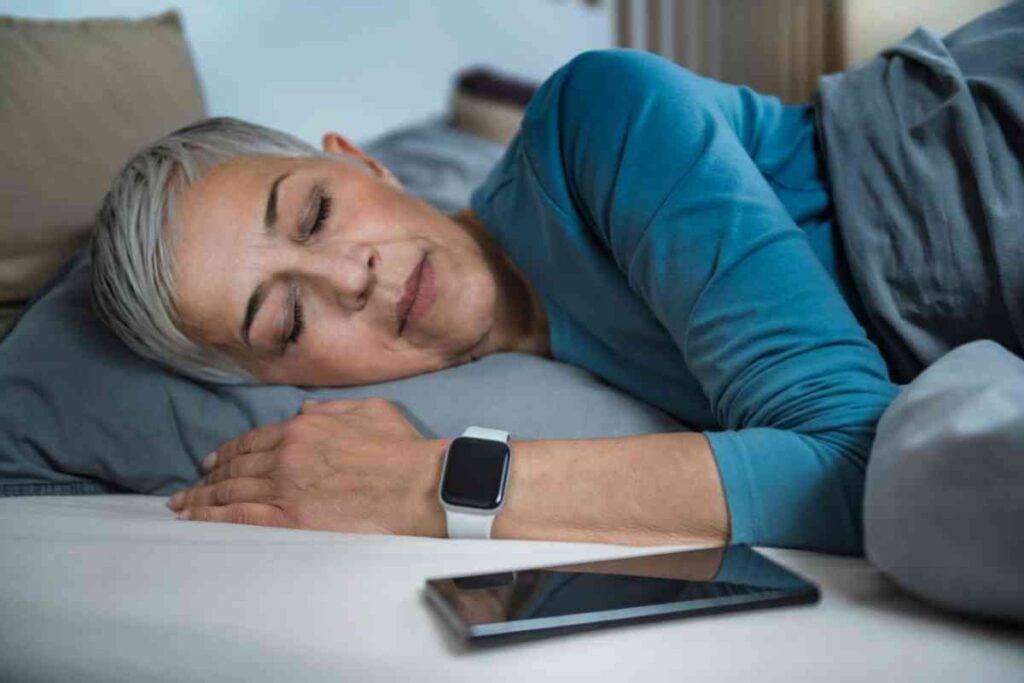4 Reasons Why Your Fitbit Is Not Tracking Your Sleep
Fitbits have an excellent sleep tracker, but it can glitch out sometimes. Here’s what you need to know about Fitbit not tracking your sleep.

Why Isn’t My Fitbit Tracking My Sleep?
There are multiple issues that could cause your Fitbit to stop tracking your sleeping patterns. Maybe you are wearing the watch loosely. Maybe you need to update or restart your Fitbit watch. Your Fitbit could also be low on battery, or maybe you’re not sleeping enough.
We’ve been using Fitbit watches for as long as we can remember, and we’ve definitely come across this issue multiple times over the years. Here, we’ll discuss why your Fitbit is not tracking your sleep.
Why Your Fitbit Watch Isn’t Tracking Your Sleep

You Are Wearing It Too Loose
If you’re not getting accurate sleep data from your Fitbit device, it could be because you’re wearing it too loosely.
The device needs to be snug against your wrist in order for the sensors to accurately track your sleep patterns. Otherwise, it may just register that you’re awake and moving around, even if you’re actually asleep.
So if you do not see the results you want, make sure to wear your Fitbit a little tighter before going to bed.
You should also avoid wearing it while doing activities that could cause it to move around too much, such as cooking or working out.
With a little tweaking, you can ensure that your Fitbit provides accurate sleep data that can help you improve your overall health.
You Need to Restart or Update Your Fitbit
You may need to update your firmware. Updating to the latest version of Fitbit’s software, called firmware, should fix this problem.
To do this, open the Fitbit app on your phone and tap the Today tab > your profile picture > Advanced Settings.
From here, scroll down and tap Check for device update. If an update is available, you’ll be prompted to install it.
Once the update has been installed, restart your device to complete the process. After that, your sleep tracking should return to normal.
If it doesn’t, contact customer support. They can troubleshoot further with you and may need to replace your device.
Firmware updates usually happen automatically in the background, so it’s possible that you already have the latest version installed.
But if you notice that your device isn’t tracking sleep correctly or having other issues, check for an update as a first step.
Fitbit Is Low on Battery
Fitbit has a few different ways to track sleep, and each one requires a certain level of battery life in order to function properly.
If your Fitbit is low on battery, it may not be able to track sleep correctly. Try charging your Fitbit before going to bed, and make sure that the Fitbit is snugly fastened to your wrist.
If you’re still having trouble, you may need to adjust the sensitivity setting in the Fitbit app. By increasing the sensitivity, you’ll make it more likely that the Fitbit watch will be able to detect your sleep movements.
However, keep in mind that this will also decrease battery life. If you’re still having trouble after trying these tips, contact Fitbit customer support for more help.

Lack of Sleep
If you’re not seeing any data on your sleep tracker, there are a few possible reasons why. First, make sure that you’re wearing your Fitbit to bed.
The tracker needs to be in close contact with your skin to accurately track your sleep. Second, check to see if the tracker is properly positioned. It should be snug but comfortable, and you should be able to wear it all night without issue.
Finally, if you’re still not seeing any data, it’s possible that you’re not actually sleeping enough.
Even if you think you’re getting a good night’s sleep, you may suffer from insomnia or other sleep disorders. If you suspect this is the case, consult a doctor or sleep specialist.
What to Do If Your Fitbit Fails to Track Your Sleep
Update and Restart
If your Fitbit isn’t properly tracking your sleep, there are a few things you can do to try and fix the issue. First, check to see if there are any updates for your Fitbit in the app.
If there are, make sure to install them. Next, restart your Fitbit by holding down the button on the device for 10-15 seconds.
Once it’s restarted, go into the app settings and make sure that Fitbit is allowed to update in the background.
Lastly, if none of these steps seem to be working, you can try resetting your Fitbit by going into the app settings and selecting “Factory Reset.” Keep in mind that this will erase all of your data, so you’ll need to set up your Fitbit again from scratch.
Factory Reset
You may need to factory reset your device if you find that your Fitbit isn’t tracking sleep properly.
Factory resetting will delete all of the data on your Fitbit, so be sure to write down or copy any important information you want to keep before proceeding.
To factory reset your Fitbit, start by making sure it is fully charged. Then go into the “settings” icon on your device and select the “about” section.
At the bottom of the “about” page, you will see an option to “factory reset” your Fitbit. Select this option and confirm when prompted. Your Fitbit will now be reset and ready to use again.
Clean Your Fitbit
If you’re noticing that your Fitbit isn’t tracking sleep as accurately as it used to, it might be time to clean it.
To do so, start by turning your Fitbit completely off. Next, use an electronics cleaner to clean out every crevice in your device.
Once you’ve cleaned your Fitbit, turn it back on and check to see if the sleep tracking feature is working properly.
If not, consult the Fitbit support website for further troubleshooting steps. By cleaning your Fitbit regularly, you can help ensure that it continues to accurately track your sleep patterns.
Remove and Re-Add
If your Fitbit device is failing to track sleep, there is a simple fix that you can try. First, delete the Fitbit app from your phone.
Then, restart your Fitbit device. Next, re-add the Fitbit app to your phone and restart your Fitbit device once more.
This should fix the problem and allow your Fitbit to accurately track your sleeping patterns once again. If this does not work, you may need to contact customer support for further assistance.
See How You Are Using the Watch
First, ensure that your Fitbit is fully charged. If the battery is low, it may not be able to accurately track your sleep. Second, make sure that the Fitbit is on your non-dominant hand.
If it is on your dominant hand, you may unconsciously move it during the night, which can disrupt sleep tracking.
Lastly, ensure that the back of the Fitbit is in contact with your skin. If there is a gap between the device and your skin, it may not be able to accurately track your sleep.
If you follow these steps and still find that your Fitbit is not tracking sleep correctly, please contact customer support.
Key Takeaways
- Your Fitbit should be tied tightly to your wrist.
- It should be charged and must also have the necessary updates.
- You also need to make sure you are getting enough sleep.
- In some cases, you will have to clean your Fitbit.
- In some cases, you will need a factory reset.
- Make sure you are wearing it on the non-dominant hand.
